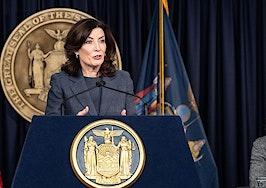In these times, double down — on your skills, on your knowledge, on you. Join us Aug. 8-10 at Inman Connect Las Vegas to lean into the shift and learn from the best. Get your ticket now for the best price.
Sometime between 2007 and 2010, with the subprime loan crisis in full view, consumers lost faith in the real estate market and raced to dump their property. It was like a virus, and it was scary.
Millions of homeowners were underwater by rapidly rising mortgage payments on their variable rate loans. Owners scrambled to sell their homes, others walked away from their houses and their obligations. The banks foreclosed and they dumped seven million houses on the market.
A real estate contagion was at work and it was unstoppable.
When supply flooded the market, prices plummeted. An estimated $7 trillion in house equity vanished in mere months as the housing market unraveled.
Three hundred banks went under from 2007-2010 when Washington Mutual collapsed.
The contagion that hit the financial markets over the past week unfolded more quickly, enabled by iPhones and digital banking.
A staggering $40 billion in deposits were withdrawn from a single bank in a matter of hours. Within a few days, Silicon Valley Bank was seized by federal regulators.
Other regional banks suffered huge losses. Now, everyone is working overtime to contain the contagion.
It’s a sorry sight when customers line up outside of bank branches — a frightening image of financial and government failure.
It was the same sad story with FTX six months ago, when crypto depositors suddenly offloaded their tokens. Then, the dominos fell, as other exchanges, two crypto banks and hundreds of related businesses collapsed in a matter of weeks.
I never believed in the contagion theory that these events are a function of irrational consumer behavior.
The public’s self-interest is very real and their actions are quite rational.
Our free-wheeling financial system is the problem. While banks are heavily regulated, they fail because of holes in the system that leave it unprepared for unexpected events.
The public pays the bill for institutional shenanigans.
In the case of crypto, it was underlying fraud that scared investors away. In banking, sloppy management and asleep regulators are to blame.
Could a contagion hit real estate again? Not now, would be my best guess. But cavalier lending, greed and bad actors can ruin any real estate party.
Some believe commercial real estate is teed up for another big property disaster. Too much leverage, sky high vacancies and falling rents are a recipe for another financial tsunami.
Like a virus contagion, once it begins spreading, it knows no limits. Then, leadership is too late.













